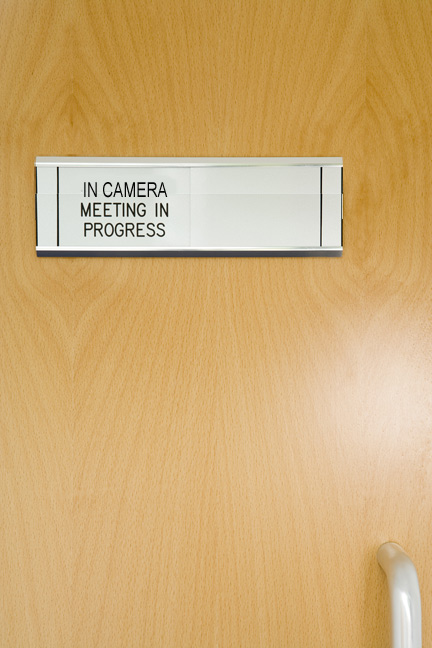The Supreme Court of Canada has ruled a teacher’s union can call witnesses from an in camera school board meeting that took place in 2009.
 Last Friday’s Commission scolaire de Laval and Fédération des commissions scolaires du Québec (Board) v. Syndicat de l’enseignement de la région de Laval and Fédération autonome de l’enseignement (Union) related to a special meeting of the executive committee of the Commission scolaire de Laval, about whether a teacher who had run into prior trouble with the law and had a criminal record should be allowed to continue to work.
Last Friday’s Commission scolaire de Laval and Fédération des commissions scolaires du Québec (Board) v. Syndicat de l’enseignement de la région de Laval and Fédération autonome de l’enseignement (Union) related to a special meeting of the executive committee of the Commission scolaire de Laval, about whether a teacher who had run into prior trouble with the law and had a criminal record should be allowed to continue to work.
After hearing the teacher in a partially in camera meeting, the executive committee had a full in camera meeting. Then, the committee had a public meeting where a resolution was adopted ending the teacher’s contract. The union filed a grievance.
In the ruling, the Supreme Court held an appeal by the school board should be dismissed, after the board objected to having committee members who were present at the meeting testify as part of the grievance process.
“The Board objected to having them testify, arguing that the motives of individual members of the committee were irrelevant and that deliberative secrecy shielded the members from being examined on what had been said in camera,” said the ruling.
The board also argued motives of the committee members were “unknowable” and ruled out “the examination of the members of any collective body on the motives that underlie a decision made by way of a written resolution.”
The Supreme Court, however, disagreed.
“The principles that the motives of a legislative body are 'unknowable' and deliberative secrecy do not apply to a public employer the Board in this case, that decides to take disciplinary action against an employee, even if an in camera meeting is ordered,” said the ruling.
According to the ruling, the arbitrator allowed for examination of committee members, but the Superior Court barred testimony, except for “the formal process that led to their decision that was announced at the public meeting.” The Court of Appeal then reversed the decision.
In its ruling, the Supreme Court said it was “reasonable” for the arbitrator to discover what had happened in camera to establish if the committee’s deliberations had been thorough.
Audrey Limoges-Gobeil, counsel with the Syndicat de l’enseignement de la région de Laval, says the “precision that this ruling brings about the standard of review, in a judicial review, will have a big [impact].”
“For administrative and labour law in Canada, it’s a major decision because it is now clear that the workers can examine the members of decision-making authority, such as an administrative board, executive council or in our case, a council of commissioners about the motives leading to any disciplinary sanction,” she says.
“Essentially, what I take from this ruling is that we cannot say in advance that a collective decision that has to be taken by a group of people and embedded in a document, like a school board resolution or a municipal council decision, we cannot say as a principle that because the resolution has to be written down, it speaks for itself,” says Yann Bernard, a partner at Langlois Lawyers LLP who represented the board.
“There will be circumstances in which we can ask the authors of the resolution to discuss not only the process that led to its adoption, but . . . what more, we don’t know yet. But the court is saying this will be the arbitrator’s evaluation of relevance, what is relevant, what is not.”
Bernard says the board’s main argument was “that if you’re asking a school board, a city, and type of local government to make a decision on anything, and that it has to be taken by a group of people, then written down in a resolution, then there’s no point in asking the people what they meant, what was their intention, you can only read the resolution, which may be the result of compromises.”
“The resolution speaks for itself, and says the motives,” he says. “We were submitting to the court that it’s . . . dangerous to try to question individuals on their motives or how they reached a decision, because it becomes immaterial.”










